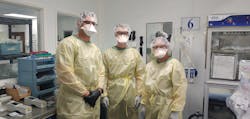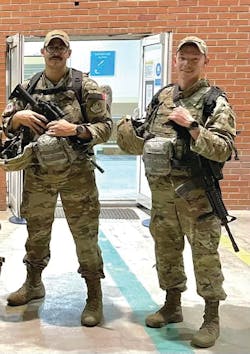Air force lab techs prove essential in Afghanistan withdrawal
Following President Biden’s April 14, 2021 announcement of the withdrawal of U.S. troops from Afghanistan, Air Force Master Sergeant Grace Hodge, section chief of corps lab services for the 60th Medical Group (which operates the David Grant USAF Medical Center at Travis Air Force Base in Fairfield, California) deployed to Bagram Air Base, just north of Kabul. Hodge was the lab team’s noncommissioned officer in charge, and accompanying her were two other lab techs from the 60th Medical Group: Senior Airman Jacob Washington and Staff Sergeant Rily Venesky.
Between April and June 2021, Hodge, Washington, and Venesky provided support to NATO’s Resolute Support Mission in Afghanistan as the United States provided airlift support during Operation Allies Refuge. This entailed COVID-19 support and trauma support, as needed, while closing down the medical treatment facility at Bagram Air Base. “We were doing a lot of COVID-19 testing for different NATO countries,” recalled Washington. “We were processing so many people from so many different countries, fulfilling individual COVID testing requirements so [people] could safely fly back home into their country.” The team assisted more than 2,200 patients, including providing blood products; testing blood samples; and performing 1,400 COVID-19 tests, which resulted in a 99.8% COVID-free rate on the base.
Shortly after arriving in Kabul, Washington forward deployed to the U.S. military’s Blood Transshipment Center in Qatar. There, Washington and Hodge continued their collaboration from different locations. The Blood Transshipment Center delivers blood products such as whole blood, red blood cells, platelets, liquid plasma, fresh frozen plasma, COVID-19 convalescent plasma, and cryoprecipitate and is the only blood transshipment center in the U.S. Central Command’s area of responsibility that spans the Middle East, Northeast Africa, and Central and South Asia. Venesky forward deployed to the lab team with the 379th Expeditionary Medical Group at Al Udeid Air Base.
Mass casualty
By August, the situation at Hamid Karzai International Airport grew chaotic as the Taliban took over the area and thousands of Afghans, in their desperation to flee the Taliban, flocked the airport to make it onto an outbound flight before the August 31 deadline. Hodge was one of only two lab techs working alternate 24-hour shifts at the hospital in Kabul.
On the afternoon of August 26, 2021, confusion and chaos turned into horror as one suicide bomber attacked the crowd, setting off an explosion that killed more than 150 Afghans and 13 U.S. service members. Hodge remembered the sound of pagers as everyone received the emergency alert. “I was the only on-duty lab tech at that time,” Hodge said. The attack forced troops to quickly adapt their drawdown plans and respond to the mass casualty. “Prior to the attack, teams were preparing to leave the area,” Hodge said. “Suddenly, everything changed, and our main goal shifted from COVID-19 support to blood supply and triage.”
“When patients arrived, it didn’t matter who you were,” said Hodge. “We helped anyone who needed it.” Hodge, along with her Norwegian counterpart and three lab techs, two with the U.S. Navy and one from Great Britain, supported the trauma cases however they could. A lab tech’s job during a mass casualty incident involves managing traumas, “making sure we have whole blood for the patients that need it and taking blood samples for testing,” Hodge explained. “It was chaos at first. There were times a lab tech had to go with the nurses or runner to find out who needed blood and where.” While one lab tech was with the nurses or runner, two lab techs were busy running lab tests on i-STAT and blood typing using EldonCards. The fourth lab tech became a runner for additional blood and lab supplies. They even provided patients toiletries, clothes, snacks, and other supplies sent by the United Service Organizations (USO) for the deployed troops.
At the Blood Transshipment Center in Qatar, Senior Airman Washington was awoken by his supervisor following the suicide bombing in Kabul. Washington said his training prepared him for emergencies like this one but acknowledged his experience in Afghanistan was exceptional because, although he works in a large hospital (David Grant USAF Medical Center), it is not a trauma center. “I’m a blood bank specialist,” he said. “I know blood. I know how to give blood. I know who needs blood.”
“Over the next couple of days, we shipped about 256 units [of blood products] into Kabul through various means because the resources were cut off and a lot of the flights were grounded.” Washington explained, “we needed to get real creative with the ways to get blood there including piggy-backing pallets of blood products on flights with special operations teams that went in on much smaller planes.” The blood went directly to the laboratory in Kabul and was used for civilians, U.S. military services, and other countries’ militaries. “Whoever needed the blood and was being treated as a trauma casualty at that time received the blood,” Washington said.
“Doing that was a very eye-opening experience,” Washington said. “It’s really an adrenaline dump like nothing else. You find out exactly who everybody is in that moment.” “It really makes you see the value of what you do firsthand, and I feel like that is something that I will not forget,” Washington said. “We were able to help a lot of people,” Hodge said. “And I’m glad we were there when that happened because if we hadn’t been there, a lot more people would have died.”
Lessons learned
During the mass-casualty (MASCAL) event, it was all-hands on deck. “Just like we practiced in every exercise, I brought our lab trauma kit and cooler containing whole blood,” said Hodge. “It helped that we prepared ourselves for the “what if” scenarios, so when the chaos started, we had at least 100 whole blood units in our inventory. We were constantly in contact with the Blood Transshipment Center in Qatar in case we needed more.” Hodge also explained, “When we left Bagram, we made sure to bring all the supplies to Kabul that we knew we would need: i-Stat CG4+ cartridge tests, i-Stat CG8+ cartridge tests, PT/INR tests, cardiovascular tests, COVID-19 tests, etc.” Hodge shared that there were numerous MASCAL exercises performed at Bagram and Kabul to prepare everyone. Emergency planning exercises also included a plan for an alternate hospital location in case the current one was compromised.
After the bomb attack, Hodge’s team still had to shut down the hospital at the airport in Kabul. “We needed to complete the retrograde,” Hodge said, explaining the process involves destroying patient records and other sensitive documents for safety as part of the evacuation. Once the hospital was shut down, she boarded the aircraft leaving Kabul with two important lessons. Lesson one: “Don’t take for granted what freedoms we have — always remember those Soldiers, Sailors, Marines and Airmen that paid the ultimate sacrifice to have the freedoms we have.” Lesson two: “Always take training seriously because at any given time, your role can change, and fill that role to the best of your ability whether you are part of security or triage team.
About the Author
Military Health System Communications Health System Communications
The Defense Health Agency (DHA) is a joint, integrated Combat Support Agency that enables the Army, Navy, and Air Force medical services to provide a medically ready force to combatant commands in both peacetime and wartime. The DHA uses the principles of Ready Reliable Care to advance high-reliability practices across the Military Health System by improving system operations, driving innovative solutions, and cultivating a culture of safety.

